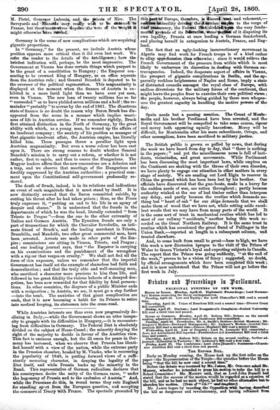While Austrian interests are thus even now progressively de- clining
in Italy,—while the Government shows an utter incapa- city to grapple with its diffioulties in Hungary,—it is encounter- ing fresh difficulties in Germany. The Federal Diet is absolutely divided on the subject of Hesse-Cassel ; the minority denying the right of the majority to decide in favour of the Austrian view. This fact is ominous enough, but the ill omen for peace in Ger- many has increased, when we observe that Prussia has identi- fied herself with a view of the nation, while the extreme party in the Prussian chamber, headed by M. Vincke, who is recovering the popularity of 1848, is putting forward views of a suffi- ciently menacing character, in denying the legality of the Diet itself, and while Prussia backs up the minority in the Band. This representative of German radicalism declares that his countrymen desire the unity of the German races, " under the hegemony of Prussia and to the exclusion of Austria." And, while the Prussians do this, in round terms they rate England for standing ap irt from the European question, and accepting the commero:al Treaty With France. The spectacle presented by this part ref Europe, therefore, is iliscori Ned and vehement,— reellasseriatbecility drivI theAditatrian Milk to the verge of fitiltl'ldtlstumacy, the Fedesal lebt divideittlytt the very funda- mental krotnds of its feeffatten, nOmelftanilin of it disputing its own legality, Prussia at once leading a German Sonderbund, and placing herself in antagonism to Austria, France, and Eng- land.
The fact that an ugly-looking insurrectionary movement in Algeria may find work for French troops is of a kind rather to alla,y apprehension than etteerwise ; since it would relieve the French Government of the pressure from within which is most likely to embarrass its discretion in dealing with German ex- travagancies. Indeed, the desperate aspect of affairs in Vienna., the prospect of gigantic complications in Berlin, and the ap- parently reckless helplessness of Naples and Rome, imply a state of distracted councils amongst the royal class of Europe, with endless diversions for the military forces of the continent, that might leave the peoples freer to exercise their own political views ; the people, however, always being guided by those men whopos- sess the greatest sagacity in handling the motive powers of the day.


























 Previous page
Previous page